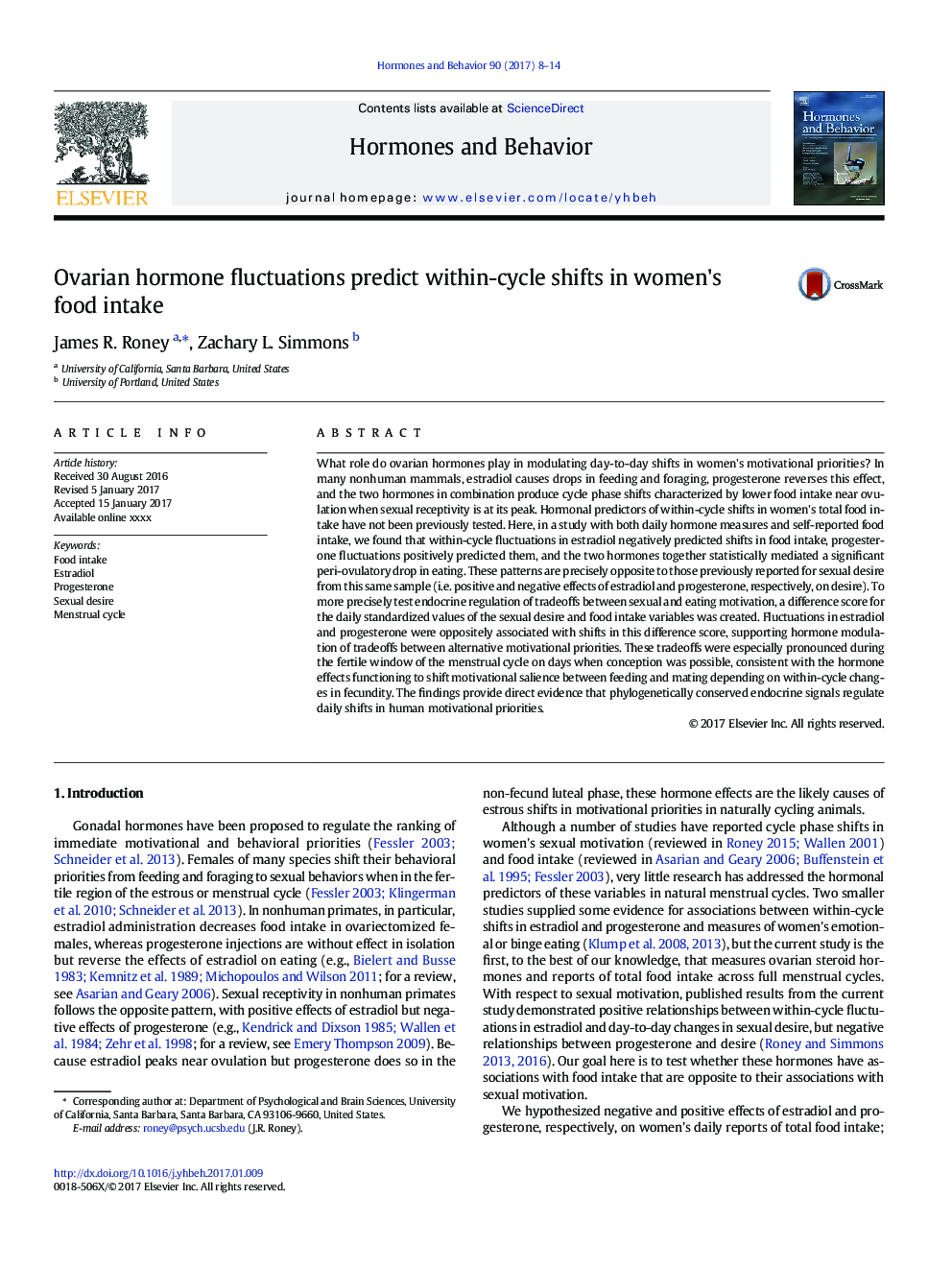| کد مقاله | کد نشریه | سال انتشار | مقاله انگلیسی | نسخه تمام متن |
|---|---|---|---|---|
| 4931032 | 1432750 | 2017 | 7 صفحه PDF | دانلود رایگان |
عنوان انگلیسی مقاله ISI
Ovarian hormone fluctuations predict within-cycle shifts in women's food intake
ترجمه فارسی عنوان
نوسانات هورمون تخمدان پیش بینی تغییرات درون چرخه مصرف مواد غذایی زنان است
دانلود مقاله + سفارش ترجمه
دانلود مقاله ISI انگلیسی
رایگان برای ایرانیان
کلمات کلیدی
مصرف غذا، اتراستیل، پروژسترون، تمایل جنسی، چرخه قاعدگی،
ترجمه چکیده
هورمون های تخمدان نقش مهمی در تعدیل تغییرات روز به روز در اولویت های انگیزشی زنان دارند؟ در بسیاری از پستانداران غیر انسانی، استرادیول باعث قطرات در تغذیه و تغذیه می شود؛ پروژسترون این اثر را به حالت تعلیق درآورد و دو هورمون در ترکیب باعث تغییرات فاز چرخه ای می شود که با مصرف غذائی کم در نزدیکی تخمک گذاری، هنگامی که حساسیت جنسی در اوج خود است. پیش بینی کننده های هورمونی تغییرات داخل چرخه در مصرف غذا در کل زنان پیش از این آزمایش نشده اند. در مطالعه ای که با هر دو اندازه گیری هورمون روزانه و مصرف غذای خود گزارش شده است، ما دریافتیم که نوسانات درون فاکتور در استرادیول منفی تغییرات در مصرف غذا را پیش بینی می کند، و این در حالی است که نوسانات پروژسترون مثبت آنها را پیش بینی کرده و هورمون های دوگانه به طور میانگین، تخمک گذاری در غذا خوردن. این الگوها دقیقا مخالف کسانی هستند که قبلا برای میل جنسی از این نمونه مشابه گزارش شده اند (به عنوان مثال اثرات مثبت و منفی استرادیول و پروژسترون، به ترتیب بر میل). برای دقیق تر تنظیم مقادیر غدد درون ریز از تجارت بین انگیزه جنسی و خوردن، نمره اختلاف برای ارزش های روزانه استاندارد میل جنسی و متغیرهای مصرف غذا ایجاد شد. نوسانات استرادیول و پروژسترون با تغییرات در این نمره تفاوت، با حمایت از تعدیل هورمون های تجاری بین اولویت های انگیزشی جایگزین همراه بود. این ترکیبات به ویژه در طول پنجره بارور چرخه قاعدگی در روزهایی که ممکن بود مفهوم امکان پذیر است، سازگار با اثرات هورمونی که برای تغییر اهمیت انگیزشی بین تغذیه و همبستگی بسته به تغییرات درون چرخه باروری، مطرح شد. یافته ها شواهد مستقیم نشان می دهد که سیگنال های غدد درون ریز محافظت شده با فنلوژنیک، تغییرات روزانه در اولویت های انگیزشی انسانی را تنظیم می کنند.
موضوعات مرتبط
علوم زیستی و بیوفناوری
بیوشیمی، ژنتیک و زیست شناسی مولکولی
علوم غدد
چکیده انگلیسی
What role do ovarian hormones play in modulating day-to-day shifts in women's motivational priorities? In many nonhuman mammals, estradiol causes drops in feeding and foraging, progesterone reverses this effect, and the two hormones in combination produce cycle phase shifts characterized by lower food intake near ovulation when sexual receptivity is at its peak. Hormonal predictors of within-cycle shifts in women's total food intake have not been previously tested. Here, in a study with both daily hormone measures and self-reported food intake, we found that within-cycle fluctuations in estradiol negatively predicted shifts in food intake, progesterone fluctuations positively predicted them, and the two hormones together statistically mediated a significant peri-ovulatory drop in eating. These patterns are precisely opposite to those previously reported for sexual desire from this same sample (i.e. positive and negative effects of estradiol and progesterone, respectively, on desire). To more precisely test endocrine regulation of tradeoffs between sexual and eating motivation, a difference score for the daily standardized values of the sexual desire and food intake variables was created. Fluctuations in estradiol and progesterone were oppositely associated with shifts in this difference score, supporting hormone modulation of tradeoffs between alternative motivational priorities. These tradeoffs were especially pronounced during the fertile window of the menstrual cycle on days when conception was possible, consistent with the hormone effects functioning to shift motivational salience between feeding and mating depending on within-cycle changes in fecundity. The findings provide direct evidence that phylogenetically conserved endocrine signals regulate daily shifts in human motivational priorities.
ناشر
Database: Elsevier - ScienceDirect (ساینس دایرکت)
Journal: Hormones and Behavior - Volume 90, April 2017, Pages 8-14
Journal: Hormones and Behavior - Volume 90, April 2017, Pages 8-14
نویسندگان
James R. Roney, Zachary L. Simmons,
